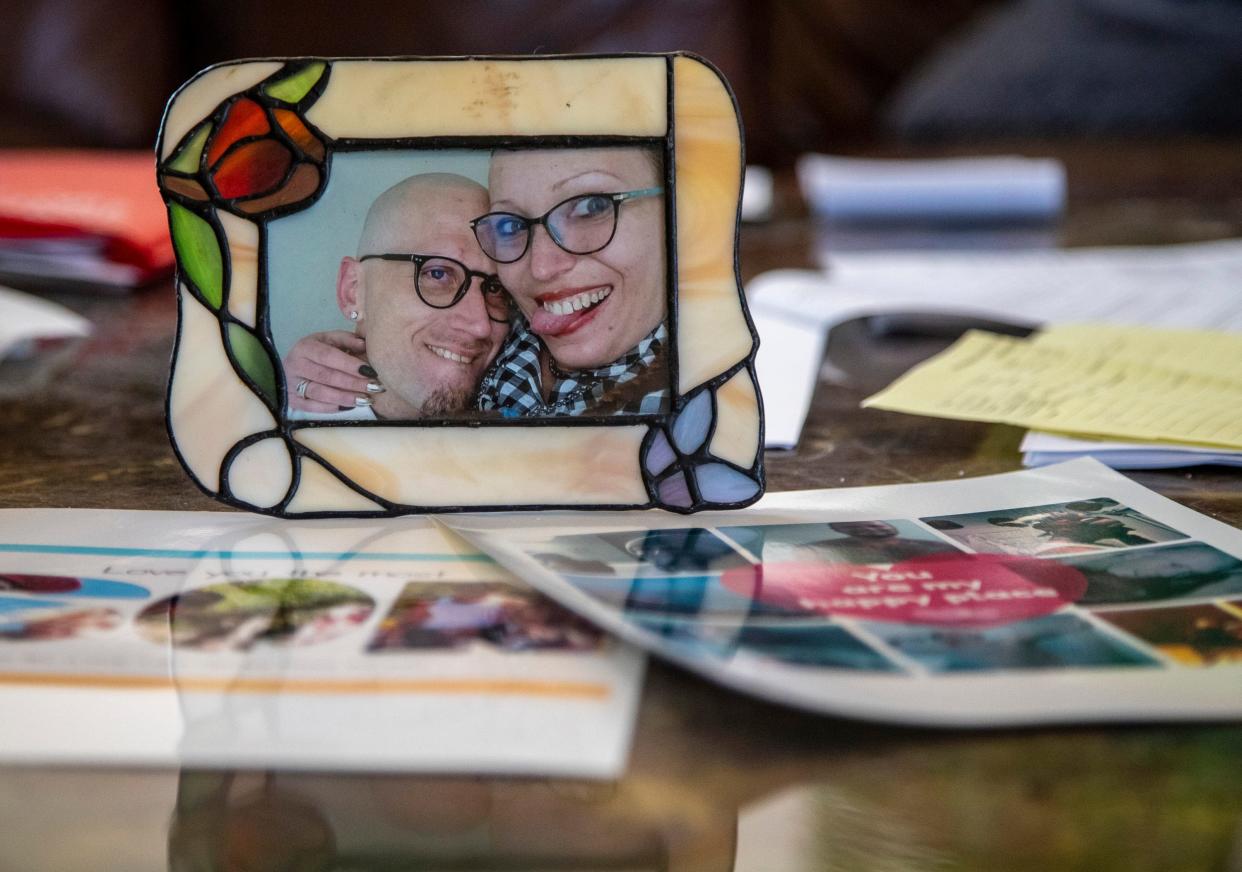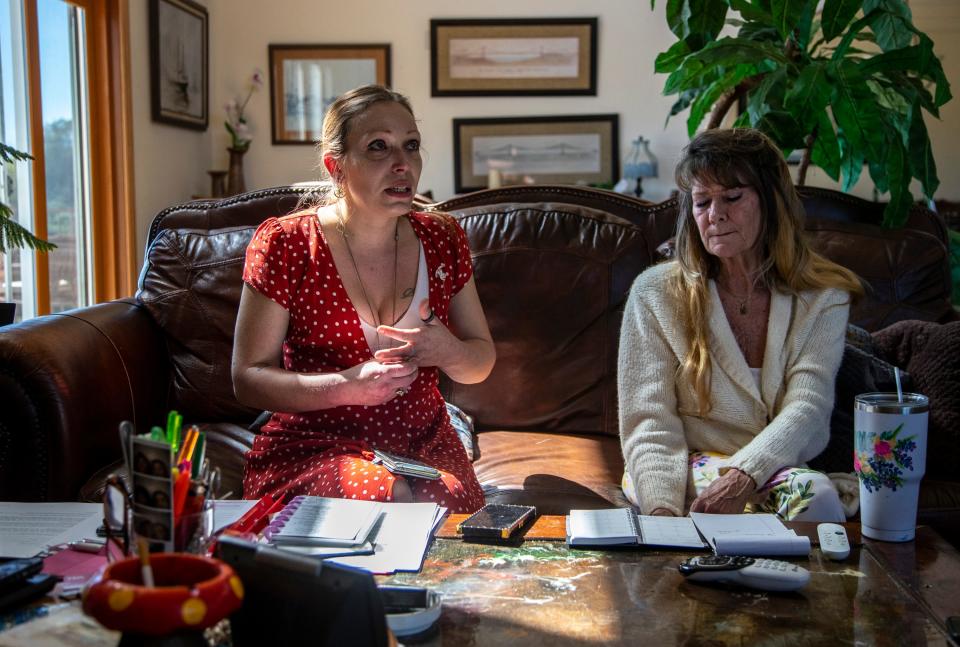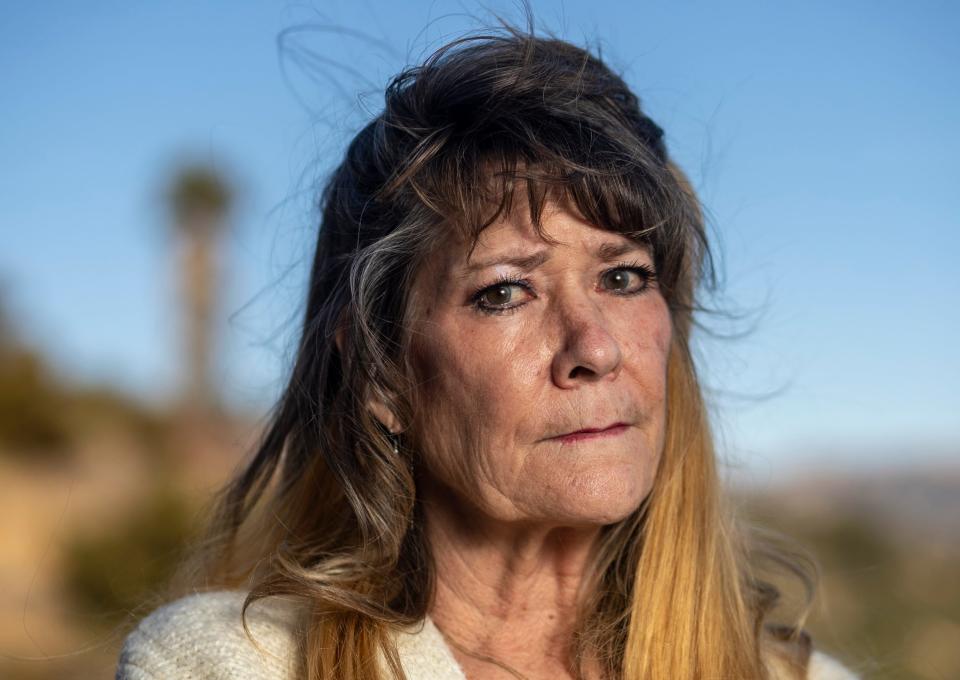Their loved ones were near death, and the Riverside County sheriff never told them

Dana Martin remembers her last call with her fiancé well. It was the kind of conversation they had once or twice a day as she and his mother worked to coordinate his release from jail.
Sean Harris called her late in the evening of Aug. 2, 2022, soon before he was going to bed. They chatted about the music they liked. She asked him if he'd written any new poetry, a hobby that had become a valued diversion from his confinement. They talked about getting married, which led to talk of having kids. He just had to resolve his case, something he vowed to do.
She told him to stay positive because he’d be out on bail soon and no matter what happened next, they could face it together.
"Life inside is hard," Martin said, citing her own stints in jail as proof, "but he had a lot to live for. We needed to do good, we told each other."
The next day, Martin didn’t get a call. And the day after, when she did, it wasn’t from her fiancé.
The wife of his cellmate phoned to offer her condolences, saying her husband watched Harris two days earlier lose consciousness while eating a cup of soup in their cell. He hit the emergency call button and administered CPR. Harris had been rushed out of the jail by first responders, and the prospects seemed bleak.
No one from the Riverside County Sheriff's Department had ever told her. They hadn't called Harris' mother, either.
With the sheriff's department now under investigation by the state attorney general for, among other things, a record number of inmate deaths, The Desert Sun reviewed how the department responds when inmates fall critically ill or die. Interviews and records show even more people have died after being in jail than the sheriff has publicly acknowledged — and that, in many cases, relatives aren't told when inmates have life-threatening medical emergencies. The sheriff's department and hospital staff often make potentially life-and-death decisions, while families are kept in the dark searching for basic information.
The Riverside County Sheriff's Department did not respond to The Desert Sun's inquiries for this story.

Sheriff's departments are not required by law to notify families of inmate medical emergencies, and many have policies permitting jail managers to do so only at their discretion.
Despite collecting emergency contact information when a person is booked, there's little evidence the sheriff's department is calling those people when inmates are taken to hospitals. Treatment, meanwhile, is limited without access to a person's medical history or other important information often only relatives have access to.
The sheriff's department’s secrecy, however, is at odds with other departments, like the California Department of Corrections and Rehabilitation, which keeps emergency contact information lists and has clear policies of contacting relatives when people serving sentences in state prison are in critical condition.
Such refusals to notify have left family members distrustful that they're receiving accurate information about what happened to their incarcerated relative and agonizing about if things could have gone differently if they were involved earlier — pain that is fueling a call for a change in law.
Prison Law Office Deputy Director Sara Norman is very familiar with the challenges incarcerated people face when they require medical care. She represents Riverside County inmates in an ongoing 2014 civil suit that established a consent decree mandating federal oversight of the county's jails. For Norman, a policy requiring the department to notify relatives when someone has had a medical emergency in jail is just the right thing to do, even if it isn't law.
"Any humane institution will have policies in place making sure they have gathered information and are keeping information so that families can be notified if their loved one is facing serious health problems and be involved in end-of-life care," said Norman.
Rushed to the hospital
Much like Martin, Ann Johnson was used to receiving regular calls from her son, who was incarcerated at the Larry D. Smith Correctional Facility in Banning. Brian O’Neal Williams would call Johnson about three times a week when he was in county jail a couple of years ago.
Then all of sudden, nothing.
A little more than a week after she last heard from him in February 2021, Williams called and told her he had been released from the hospital. He had apparently overdosed on fentanyl and lost consciousness, but he told her he didn't remember much. He was in a coma for about a week and had undergone some sort of surgery, but, didn't know the details. He woke with a tube down his throat, was returned to the jail once his condition improved and was calling to let her know.
Ekwan Terrence Allen, 45, Williams' cellmate, died of an overdose in that same incident.
"I was shocked that he was in a coma and this is the first I was hearing of it," Johnson said. "If they didn't tell me that, would they have told me if he died?"
In some cases previously reported by The Desert Sun, the answer is no.
In August, Richard and Raymond Matus were being held in Riverside County jail, charged as co-defendants in the same crime, when Raymond was called to speak with a deputy at the county jail in Murrieta. He was asked if his older brother had any medical conditions. No, he responded. Eventually, the deputy told him his brother had been found dead in his cell at the age of 29.
Raymond Matus called their mother, Lisa, and broke the news. It took weeks for her to get any information about her son's death, to collect his belongings and secure legal material important to her surviving son's ongoing case.
"How many days were they gonna let me sit here and wonder if he's alive or not?" Lisa Matus said. "When you're left in the dark like this for so long, you just assume that they're trying to hide something. There's no other way to think about it."
On life support
Interviews showed the department's secrecy about jail deaths and medical emergencies has become standard practice over the last several years, a pattern that tracks with the recent surge in jail deaths.
Peter Gutierrez suffered an apparent overdose on July 3, 2021, at the county jail in Indio. About two days after he was booked, his cellmate told deputies he needed help, according to a coroner's report. They found him unresponsive in his cell, administered NARCAN and he was transported to a local hospital. His reaction to the rapid treatment for opioid overdose indicated he had likely ingested fentanyl, a deadly synthetic opiate that is fueling a surge of deaths in the county’s jails. He was intubated and in a semi-comatose state for days, the coroner’s report reads.
Louie Gutierrez, Peter's father, who is listed in the coroner's report as his next of kin, is said to have been present at the time of his son’s death. A week after he was taken to the hospital, the Gutierrez family was "consulted and advised of a poor prognosis of survival” after it was determined blood was no longer flowing to his brain.
Doctors at Desert Regional Medical Center pronounced the 34-year-old brain dead about 10 days after he was first admitted to their care. What happened next and the role the Gutierrez family played in Peter's final days is unclear from the department’s records.
“He was kept on mechanical life support until further family could be consulted,” the coroner’s report reads.
About two days later, the department contacted One Legacy, a company that harvests organs. One of its representatives confirmed that Gutierrez was an organ donor, according to the report.
"One Legacy was finalizing the paperwork to take over Gutierrez’s care in preparation for organ procurement and was planning to approach his family to seek authorization to harvest Gutierrez’s organs and tissues," the coroner’s report reads, but there's no further mention of whether or not they were notified or consented. His family did not respond to inquiries from The Desert Sun.
On July 14, Chief Forensic Pathologist Mark Fajardo approved One Legacy’s request to harvest Gutierrez’s organs, according to the report.
His family has since sued the county claiming that other inmates witnessed Gutierrez pleading for medical attention long before he was found unresponsive, pleas, they claim, that were ignored.
"It was pretty obvious he needed help, and they just blew him off," said Jerry Steering, the lawyer representing his survivors.
Inconsistent policies
There is no law requiring the agencies that manage California's jails and prisons to notify relatives that an incarcerated person has fallen gravely ill, been the victim of violence resulting in hospitalization or otherwise is in serious or critical condition.
Some do it anyway, including state prisons.
The Desert Sun spoke with and analyzed the policy manuals of several other departments and found they lacked any such guarantees.
In San Bernardino County, shift supervisors are required to contact the immediate family or a responsible party of an incarcerated person with a life-threatening illness. The policy states the relatives are told the nature of the illness, location of the incarcerated person and given a phone number to call for medical information.
In Los Angeles County, when an inmate's death is imminent, their next of kin are notified and can be allowed visitation, if there aren't any safety concerns. The policy includes that in some cases a compassionate release process can be expedited. However, any notifications are at the discretion of a watch commander or other administrator.
In Orange County, people are asked during booking for a next of kin contact, including address and phone number. A watch commander will contact that person if the inmate's medical condition is serious or could result in death, according to policy there.
The Riverside County Sheriff's Department similarly collects emergency contact information at booking, public records show. It also has a policy establishing "only a watch commander" will notify a person's next of kin in cases of serious illness or injury, and only when an inmate is incapable of doing so.
Johnson, whose son was in a coma before receiving surgery, never got a call from the department. Matus only learned of her son's death from her other son. And several others didn't receive notification when inmates were not physically or mentally capable of making the notification on their own, despite the department's policy.
Riverside University Health System Executive Director Michelle DeArmond said that inmates receive medical care and their medical information is treated exactly like people who aren't in custody.
"RUHS follows state rules regarding the release of health information for all patients regardless of status," said DeArmond.
Adam Blackstone, a senior vice president at the Hospital Association of Southern California, a trade group representing hospitals in the region, said that what information is released and to who depends on the condition of the patient.
If the person is conscious and able to make decisions, the hospital will release information to a relative after they obtain the patient's agreement or can reasonably infer the patient consents. If a patient is incapacitated, the hospital can provide a family member with information if it's relevant to their role in the person's care. Inmates retain the right to refuse medical care, Blackstone added, and if they can't make that decision for themselves, a family member can step in.
But if relatives are never contacted and told an incarcerated person has been hospitalized, they wouldn't know how to request medical information or be present to make decisions on their behalf. They're effectively excluded from the moments their relative most needs them. Dana Martin and Suzanne Baer know this firsthand.
‘At any cost…’

Martin said the Aug. 4 call about her fiancé left her stunned and worrying the worst had already happened. She had been told by Harris' cellmate that he lost consciousness soon after their last call, 48 hours earlier.
When she called Harris' mother, the two began a feverish search for more information, fearing they'd likely confirm he had died. In the days that followed, they kept notes and recorded phone calls, saying in their panic they didn't trust themselves to be able to remember the details of the conversations they had.
They started by calling the Cois M. Byrd Detention Center in Murrieta, where Harris was housed during their last phone call. They began hitting walls immediately.
Several of the recorded calls capture sheriff's employees telling Baer that either they don't know anything or that they are limited in what they can tell her. Some cite HIPAA, a medical privacy law that does not limit the department from providing information about what hospital he was at or his basic condition.
Several put her on hold while they asked around. One said she was filling in and had no idea what had happened in that area of the jail before she arrived for the shift.
"If any inmates go to the hospital, we don't give that information out," the jail employee told her.
"You don't even know if he's alive?" Baer asked.
"I don't know anything," the employee responded. "I don't work this end of the week."
All of them said someone with more information will call her back. But when, they couldn't say. As frustrating as the calls were, she eventually began to pry bits of disjointed information from the department.
"I understand he's been in the hospital for two days and nobody knows anything about it?" Baer asked one sergeant.
"Correct," the sergeant told her. "Well, there's things we, we don't give information out."
"You can't tell me anything? If he's alive or dead?" Baer later asked.
"No," the sergeant responded. "I just know he's at the hospital."
Martin, meanwhile, went in person to several hospitals to see if she could find any record of Harris being there. She couldn't.
Baer called another sergeant, who finally told her Harris was in the intensive care unit at RUHS in Moreno Valley. When she asked his condition, the sergeant responded that he couldn't say, adding: "He's in our custody."
Baer said she realized she needed to take matters in her own hands.
"Most people couldn’t afford it,” Baer said. "But I had to do it. I needed to know where he was and what condition he was in at any cost."

She gathered some savings and paid $120,000 to bail her son out of jail, only to be told he wasn't in Moreno Valley but at a hospital about 10 miles from her Fallbrook home. The department never told her why the sergeant had given her the wrong hospital.
What she found was that her son had been in a medically-induced coma for several days. Doctors suspected he had overdosed on fentanyl, methamphetamine or both, but didn't know for sure. They told her he was unlikely to recover, a prognosis she had trouble accepting. After all she had been through, she said, she had lost trust that Harris had been given adequate medical treatment.
"What did I expect? I certainly didn’t expect anything like this," Baer said. "This wasn’t gonna happen to my son. He’s a fighter. I wasn't gonna let them leave him for dead."
Baer, like most people in the general public, didn't know the sheriff's employees she had been calling for days could have told her Harris' location. She didn't know he wasn't able to contact her himself and that she could make medical decisions on his behalf.
Martin said she was similarly troubled by her fiancé's condition when they posted bail: "The hospital was telling us they didn’t do certain things because they didn’t know his medical history. So, nobody was on the same page. We honestly didn’t know if he was in the condition he was in because they failed to treat him properly. We didn’t know anything. And by then we didn't trust anybody."
Over the next several weeks they watched as he occasionally opened his eyes, appearing to regain awareness or attempt to communicate, before again lulling back into unconsciousness. He had what appeared to be a seizure at one point and attempted to bite down on his feeding tube in a panic at another. There were hopeful moments when he appeared to respond to their questions. And many other moments where the medication he was on left him a motionless shell of the man he'd been before.
About a week after he was carted out of the jail, Baer said, doctors began recommending she pull the plug and let her son die. She and Martin resisted the idea, saying they hadn’t been given enough information about what had happened to him and what treatment he had received before he was bailed out. Plus, the information they did have made them more suspicious, Martin said: "His record showed a four-hour gap between when his cellmate hit the emergency button and intake at the hospital's emergency department. We have no clue where he was during that time."
"I started thinking if we could get him out of this facility, we might be able to get him into another where more was available," Martin said, hoping they could find someone who could specifically treat his brain condition.
So they took him out of the Murrieta hospital to her home on hospice care. "There was some hope," Baer said. For days they monitored him. They sang to him. They had friends come over to talk to him.
Then, on Sept. 16, Harris died.
Baer had difficulty describing her son's final day at their home nestled among groves of citrus and avocado trees, and ultimately decided against putting her pain into words.
"I didn't bring him home to die," said Baer. "But I'm glad he was home when he did."
Letting families know
Many of those who died faced serious charges. But their families said they deserved their day in court and the chance to turn their lives around. The vast majority of people incarcerated in the county's jail, and among the record number who died last year, have not yet been convicted.
Ann Johnson said she's baffled that her son was able to get enough fentanyl in a secured facility to put him in a coma in the first place ― a concern other relatives echoed. And she fears that access is creating addictions among the idle with little more to do behind bars than kill time.
"They go to jail to clean up and do better and they come home with an even bigger problem?" Johnson said. "That shouldn’t be. You’re supposed to be rehabilitating the best you can, and you’re gonna become a drug addict while you’re in there."
Martin said the experience has left her feeling like Harris was hidden inside a system that prevented his family from doing everything they could to save his life. She and Baer said the experience has led them to advocate for change.
"The public needs to know that this could happen to anybody who finds themselves with a relative in jail," Baer said. "They could have released him so we could take care of him with our own doctor. Put an ankle bracelet on him if you need to track his location. We could have taken better care of him than the hospital did."
The emergency contacts inmates provide when booked should be notified after a medical emergency, she and Martin said, regardless of what individual jail staff think. They added that families — not the sheriff’s department — should be involved in end-of-life decisions.
"This should not be in the hands of deputies," Martin said. "They are not next of kin or a spouse and shouldn’t be making life-altering medical decisions. The law should require that."
The Prison Law Office attorney, Norman, said that in the absence of a state law or any kind of tracking, it's impossible to know which departments are notifying relatives about these emergencies and which aren't.
"Any well-run corrections system will have identified personal contacts and have all the paperwork in place before something like this happens," Norman said. "The time to think of this is not when somebody is dying, but when somebody is booked."
Martin took it further, saying the hefty price of bail wasn't needed for them to be involved in the end of her fiancé's life and shouldn't have kept them from him for three days.
"The sheriff’s department should compassionately release inmates who are no longer a threat to society to their families in these kinds of cases," Martin said. "We shouldn't have had to pay in order to know his location and his condition and to have a say in his medical care, only for him to die."
Christopher Damien covers public safety and the criminal justice system. He can be reached at christopher.damien@desertsun.com or follow him at @chris_a_damien.
This article originally appeared on Palm Springs Desert Sun: With inmates near death, Riverside County sheriff didn't tell families

